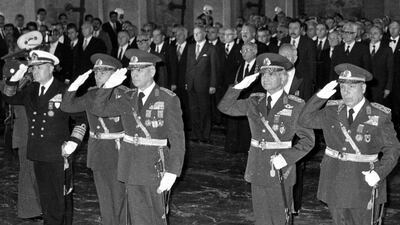On Mother’s Day, Turkey heard of the death of Kenan Evren (1917-2015), the Turkish general who led the 1980 coup and became president. The coincidence was used in some of the harshest appraisals of Evren’s life. Selahattin Demirtas, co-leader of the opposition People’s Democratic Party, said attending Evren’s funeral would “disrespect the mothers whose children were lost during the coup”.
When a government politician begged off commenting on the news by invoking the tradition of not speaking ill of the dead, he was upbraided by a colleague for denying people the right to condemn Hitler and Stalin.
Politicians across the board boycotted Evren’s military funeral. People everywhere lamented that Evren, despite his conviction last year for leading the coup, had not accounted for the legacy of his putsch.
This legacy includes the so-called “balance sheet” of the coup era. More than half a million people were arrested. Thousands were tortured. Hundreds died in prisons. More than 500 people were sentenced to death. Over 50 were hanged. The list goes on.
The constitution drawn up under Evren remains in place. Turkey is still governed by a main law expressly designed to perpetuate the rationale of the coup. Turkey’s universities are still controlled by the Turkish president. The coup facilitated the transformation of Turkey’s protectionist economy to the liberalised economy of today. The junta officially adopted a “Turk-Islam Synthesis” ideology. Again, the list goes on.
A central cliché that governs many memories of the 1980 coup is that when tanks were seen on street corners, the country gave out “a great sigh of relief”.
As with all clichés, the problem with “the great sigh of relief” is not its truth, but that it deserves to be challenged.
To start, it was the junta’s own line, repeated by its backers. Reflections on Evren’s death remembered how the top American spy in Ankara at the time referred to the junta as “our boys”. The day after the coup, The New York Times’ profile of Evren was titled Friend to the West, Foe of Turkish Terrorists.
The paper’s editorial declared: “Of itself, the bloodless coup in Ankara is a tremor, not an earthquake … It is the announced aim of Turkey’s new military rulers to redeem democracy rather than displace it.”
It also reported: “Until yesterday, the comment heard most often in recent weeks was, ‘Maybe the military ought to take over for awhile’.”
Second, the “great relief” must be placed in its Cold War context, in relation to the Latin American coups of the 1970s and 1980s, the Soviet Union’s invasion of Afghanistan, the Iranian revolution, and Greece’s exile from Nato.
“Relief” should not obscure the understanding of real political interests. And today, the “relief” is presented as a tragic contrast with the “balance sheet” that followed.
Too much emphasis on this irony, however, can give cover to those who boosted the coup in the first place. Evren said he would “redeem” democracy – how could we have known that such a nightmare would follow?
The issue is this. The coup, the instances of positive media spin, and the “relief” the army was able to take credit for lived by the very problematic assumptions that politics was the problem and that power is sometimes justified in suspending politics.
Evren closed unions, political parties and newspapers, destroyed archives, outlawed public servants’ joining political or labour organisations, banned all leading politicians from office, and even banned talking about politics in public.
The problem was evidently not simply “terrorists” and inept politicians. The problem was politics itself.
This idea is still alive in Turkey, and is perhaps a most fundamental legacy of the coup. One of the main arguments being put forward by the Turkish government regarding the need to rewrite the country’s coup-era constitution is that more “efficient” governance is required to save the country from its chaotic politics.
Caleb Lauer is a freelance journalist who covers Turkey

